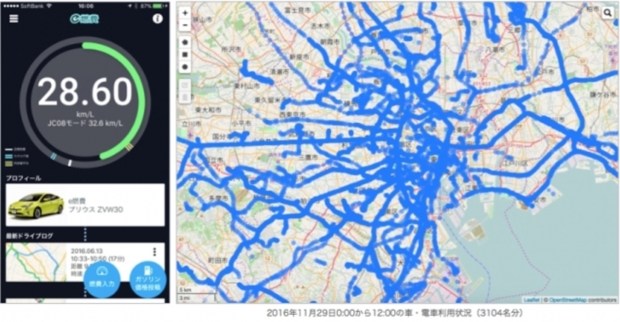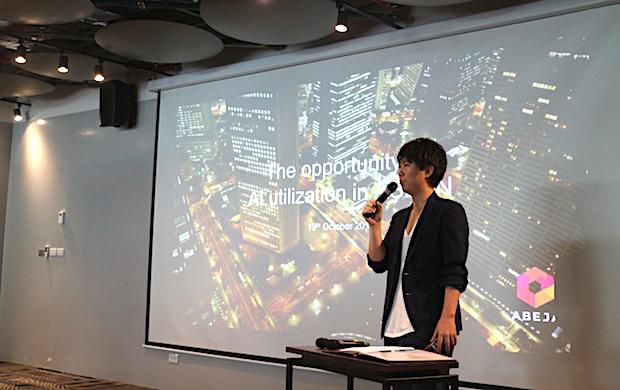
See the original story in Japanese.
Earlier this month, Culture Convenience Club (CCC for short, TSE:4756), the Japanese company well known for its CD/video rental and bookstore chain called Tsutaya, held the final public screening event for the fifth batch of its startup incubation program called T-Venture Program.
The program accepted entries for this batch from August 1st through September 14th, and the teams that proceeded on to the next round of judging spent a little over one month from November 1st to December 4th brushing up their plans for collaboration. Seven teams passed the second round to become finalists in the last examination round. The judges selected three winning startups after scoring them on four points including value creation, growth, and branding.
The program recruited startups specializing in database marketing that uses the Tsutaya video rental and bookstores, T-Site, and other platforms. Through the platforms the companies should propose lifestyle content, and then use the data obtained from the platforms and lifestyle content. Startups were recruited regardless of the type of business or industry, whether it is a corporation or individual, age, nationality, or whether the projects were in the beginning stages without any minimal viable product (MVP).
Unlike other typical incubation programs, with the T-Venture program the teams are evaluated on other important points: whether they can find their synergy with CCC, the managing organization, or whether they can come up with valuable collaborative content.
The judges were as follows:
- Muneaki Masuda – Founder and CEO, Culture Convenience Club
- Noboru Takeda – President and CEO, CCC Design
- Kazuo Nakanishi – President and COO, CCC Entertainment
- Kazuhiko Kitamura – President, CCC Marketing
- Junji Tanigawa – President and CEO, CCC Creative
- Shihoko Urushi – Principal, Shinagawa Joshi Gakuin, Principal
- Akira Shiramasa – President and CEO, CCC PhotoLife Lab
- Takeshi Yoshimura – President and CEO, Digital Hollywood
CCC Award: ToryComics by ToryWorks
Prize: 1 million T-Point points

ToryWorks has developed ToryComics, a mobile app that allows users to translate manga using crowdsourcing. It is difficult to publish many manga titles in many different languages due to the high cost of translation. With ToryComics, users can translate the dialogue in a manga episode into their mother tongue on their smartphone while viewing it, and then publish it to the global market after completing the translation. The app allows the translator to receive part of the revenue while paying copyright fee to the original author.

It is currently available for use in 13 languages in 142 countries, and a year of test marketing in Indonesia resulted in acquiring 500,000 users. One year later, by November 2019, the company plans to make it available in 18 languages in 200 countries, with a target of 3 million users. In terms or collaboration with CCC, ToryWorks proposed a plan to allow users to exchange T-Points for virtual coins that can be used on ToryComics, and a plan to allow Tsutaya Premium members all-you-can-read access to ToryComics. In the future, the company would like to distribute works from CCC affiliates and produce Japanese-Korean collaborative comics.
Outstanding Performance Award: Wall Share by 180
Prize: 500,000 T-Point points

Wall graffiti is illegal, and can make passers-by and residents feel uncomfortable, but if it is possible to obtain permission from owners and post something highly artistic, then value as a business can be created. 180 took inspiration from cities like Paris, where so-called graffiti forms an important part of the atmosphere, and Hong Kong, where it actually attracts visitors. The company matches wall owners, artists, and advertisers with the goal of developing an advertising business targeting tourists.

The company aims to produce a mobile app for graffiti stories and to show the place where users can see the art, along with a matching app that allows users to plan advertisements by matching vacant walls with artists. It is looking to monetize through the collaboration of vacant wall owners and artists, ads, paid apps, and merchandising. The company would like to collaborate with CCC on ad sales for their art specialty magazine. The company would also like to collaborate with CCC Marketing to build a marketing database by holding a stamp rally, and to host an art award at the Tsutaya bookstore in Ginza. 180 has already recruited the help of Kobe City in securing vacant walls.
TVP Award: Cametis by Kaisei Academy
Prize: 60,000 T-Point points

Cametis is a mobile app to help familiarize elementary and junior high students with musical education by first helping them practice piano exercises. Piano continues to be ranked high among extracurricular activities for elementary and junior high students, but students must practice without a teacher present which creates problems like being unable to fully grasp details. With Cametis, users can record their performance and discover their mistakes allowing them to concentrate on these areas while they practice. Additionally, there is a function that allows teachers to share their advice via the digitally displayed sheet music instead of writing it directly on the sheet music.

In order to prevent from violating copyright laws, the app specializes in classical music scores. Free users can practice the chorus of said scores. If the user likes it and wants to practice the entire song, they can purchase a package, which forms the basis of Cametis’ business model. As the number of children in Japan continues to decrease, the company is also targeting elementary and junior high school students in China, as well as the elderly. In partnership with CCC, they expect CCC to adopt Cametis as a next-generation musical education model for the “T-Kids Share Program” developed with the Mistletoe startup studio.
The following startups participated in this batch and pitched their ideas, but were not awarded a prize.
Learning Platform on Manga Technique by Hirohisa Tanaka

Hirohisa Tanaka has for many years been in a position to teach aspiring manga artists from Japan and China. According to him, when teaching manga to Chinese students their drawing level rises sufficiently, but their level of story-telling and planning does not. The reason being the absence of professional manga editors in China, unlike in Japan where manga artists and editors meet repeatedly and create the manga after hitting on a story. In addition, there are other problems such as the lack of opportunities to train manga artists, and no chance for manga artists and editors to meet each other in the first place.
Tanaka opened an online manga school for students in China with the hope of discovering and nurturing aspiring and current manga artists. At the same time, it is necessary to have professional editors who can evaluate manuscripts and submissions, so he would like to export editor training manuals. He hopes for collaborative projects with CCC’s manga submission service “Manga Hack”, Tsutaya Creator’s Program, Digital Hollywood, T-Kids Share School, and Tsutaya stores in China.
Cozre by Cozre

Cozre is a lifestyle suggestion platform for the parenting generation. The platform collects over 2.5 million answers a year from 600 genres, starting with parent’s names, children’s names, pregnancy due dates, birthdates, and other personal profiles. It then uses these profiles to develop qualitative and quantitative databases, and based on the age of the children provides recommendations for what kind of useful tips/what kind of goods the user will need and when.
In cooperation with CCC, the company proposed giving TIDs (T-point IDs) based on children’s information, so once a child is born it can become a T-card member at the age of 0. Moreover, by crossing Cozre user’s age data with CCC’s lifestyle database, it becomes possible to recommend goods for raising children according to the couple’s lifestyle. When a parent user provides information useful for other parents on Cozre, the companies could also consider plans to give points on children’s T-cards.
See also:
Self by Self

Self uses conversational AI (artificial intelligence) to allow companies and consumers to engage with each other in conversation. With the state of excessive information in recent years, Self can set up bots on websites and apps to understand the user’s values, living environment, hobbies, and emotional changes through conversation with the user. It not only collects and presents information side by side, but also “serves it” in a way the user wants, which makes it easier for users to accept.
The company explained that by teaming up with CCC it is possible to combine CCC Marketing’s purchase data and the conversational AI technology of Self to more effectively induce purchases and conduct marketing. If it is used in conjunction with the T-Point app it can calculate behavior patterns and user attributes from purchasing data and makes research possible. For example, if a married man in his 30’s makes a purchase at the nearest convenience store to his home earlier than usual, the bot answers that the man is not enjoying time with his family and recommends a DVD that can be enjoyed together.
teplo by Load & Road

Load & Road developed an IoT smart teapot called Teplo, which cooperates with smartphones to make the optimal tea according to the type of tea. Also, by analyzing the user’s pulse rate, their body temperature from their finger, the temperature outside, the room temperature, and the level of noise, it will make tea in the optimum condition for the user in that environment. They will monetize by selling pots and tea leaves. Japan and the United States are positioned as the target markets.
In collaboration with CCC, the company would like to sell hardware at pop-up stores, to sell it at Tsutaya Electrics after mass production starts, and to sell tea using the company’s teapot at T-site cafes. Based on purchasing data according to consumer attributes from the T-Point database the recommendation accuracy of Teplo improves, and additionally, based on consumption data, T-Point member companies can apply for product development too.
Stock Point by Stock Point

Stock Point is developing a point system linked with stock prices based on blockchain. When the user accumulates points on Stock Point by shopping, Stock Point cooperates as stock prices (of the manufacturer of the purchased product, etc.) rise to increase the amount of points on Stock Point. If the amount of Stock Point points becomes equal to or more than one share of the stock, the user can exchange it for stock and become a shareholder with the company. By buying the products and services of companies that the user supports, they can eventually become shareholders of the company, and companies can increase their number of fans.
In the future, Stock Point is also considering the formation of a community economy using cryptos as opposed to cooperating with the stock exchange. The existing Stock Point service only covers listed stocks, but with this new concept, the company will construct a C2C (consumer-to-consumer) investment platform that allows each community of users sharing the same interest to issue its own token. As each of these economic communities grows, holders of each crypto can make a profit. The C2C investment platform also has community activation tools, customer promotion functions, tools gathering project ideas, and the company hopes to collaborate with CCC in this area.
Translated by Amanda Imasaka
Edited by Masaru Ikeda





















































































